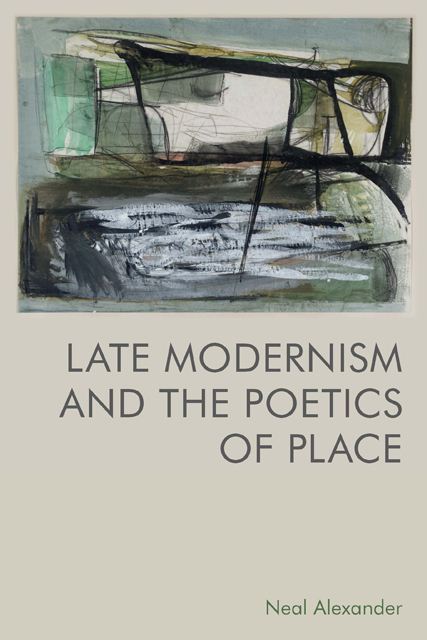Book contents
- Frontmatter
- Contents
- Acknowledgements
- Introduction
- 1 David Jones: The Sites of History
- 2 Basil Bunting’s Regional Modernism
- 3 W. S. Graham: Between Places
- 4 Lorine Niedecker: Life by Water
- 5 Charles Olson’s Mappemunde
- 6 Gwendolyn Brooks: From Bronzeville to the Warpland
- Conclusion: After Late Modernism
- Notes
- Bibliography
- Index
4 - Lorine Niedecker: Life by Water
Published online by Cambridge University Press: 18 November 2022
- Frontmatter
- Contents
- Acknowledgements
- Introduction
- 1 David Jones: The Sites of History
- 2 Basil Bunting’s Regional Modernism
- 3 W. S. Graham: Between Places
- 4 Lorine Niedecker: Life by Water
- 5 Charles Olson’s Mappemunde
- 6 Gwendolyn Brooks: From Bronzeville to the Warpland
- Conclusion: After Late Modernism
- Notes
- Bibliography
- Index
Summary
Edges are paradoxically central to the poetry of Lorine Niedecker. The defining condition for her geographical imagination is the fact that she spent most of her life by water, and her poems are strongly drawn to the meeting places between terrestrial and aquatic worlds. Aside from a few short periods in New York during the 1930s and in Milwaukee during the 1960s, Niedecker lived and died in the place where she was born (in 1903): Blackhawk Island, a low-lying, flood-prone strip of land on the banks of the Rock River where it enters Lake Koshkonong, in South-east Wisconsin. Her poems attest to a profound, bodily ‘implacement’ in both the social and the natural communities of her home place, registering its sights and sounds, the change of seasons, and the behaviour of her neighbours – both human and non-human – with a mixture of sympathy and subtle irony.
Niedecker's attachments to people and place are deep but never narrow or exclusive; her poems register the local effects of global political and economic forces, particularly the Depression years, the Atomic age, and the Cold War, bringing world-historical events into focus through her situated perspectives in the Midwest. Her politics were consistently left-wing, and she sympathised with people on the margins of American society; though she became wary of combining poetry and politics in later years. The only daughter of a fisherman, Niedecker was college-educated and her family owned several properties on Blackhawk Island; but she identified with the rural working class, worked as a librarian and hospital cleaner, and lived most of her life in some poverty. Her chosen life as a poet was kept hidden from most of her neighbours, so that she occupied the dual position of long-term inhabitant and artful observer of her native place; at once insider and outsider. This tension between social embeddedness and emotional (or political) distance is crystallised in an untitled poem of 1950, where she writes of working in a print shop ‘right down among em / the folk from whom all poetry flows / and dreadfully much else’. Although she claims that poetry ‘flows’ from its source ‘down among’ the ‘folk’, her poems are often situated at the edges of the community she claims, somewhat ambivalently, as her own.
- Type
- Chapter
- Information
- Late Modernism and the Poetics of Place , pp. 111 - 141Publisher: Edinburgh University PressPrint publication year: 2022



